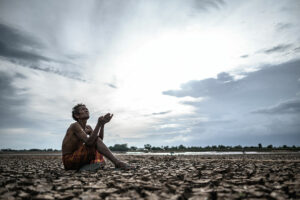After a fortnight of bitter struggle, nearly 200 countries agreed on a new goal to raise money to tackle the climate crisis at Cop29, the 29th annual UN climate conference in Baku, Azerbaijan.
Rich countries agreed to take the lead in paying $300 billion a year to the poorest nations by 2035 from a variety of financial sources (public, private, between countries, and across multilateral sources like development banks). This is less than a quarter of what developing countries asked for, and not in the form of the no-strings-attached grants money that they need.
There is no consensus on how to define “climate finance” within the United Nations Framework Convention on Climate Change (UNFCCC), the UN process for negotiating an agreement to limit global warming. Developed countries prefer a mélange of public and private funding sources, including loans and “debt swaps” (reducing or forgiving a country’s debt in exchange for that country investing money into projects that protect the environment or fight climate change). Their preference is reflected in the final Cop29 decision.
These same developed countries are responsible for most of the greenhouse gas emissions that are heating Earth to dangerous levels. Developing countries have demanded a share of their immense wealth to help them cut emissions, adapt to the impacts of a warming climate, and address the consequences of existing disasters (what is generally referred to as loss and damage). The UNFCCC estimates that developing countries need $5 trillion to $6.9 trillion to implement their national climate plans by 2030.
The original climate finance target was set in 2010 and is due to expire in 2025. This encouraged rich nations to funnel $100 billion to the developing world annually, but it was only met for the first time in 2022.
Negotiators from poor nations are right to be frustrated. While the latest UN Intergovernmental Panel on Climate Change report suggests that there is enough money in the global economy to properly fund a green transition, the financial system is systemically skewed against developing countries.
DEBT AND INEQUALITYThe World Bank and other international monetary institutions were conceived at the end of the second world war, before many of the countries they affect had gained independence, calling into question the legitimacy of a global regime conceived in the colonial era.
In 2022, 58 of the world’s poorest and most climate-vulnerable countries spent $59 billion repaying debts compared to the $28 billion they received in climate finance, over half of which were loans.
The cost of borrowing money can be up to seven times higher for developing countries than the US and Europe. This is because lenders see poorer countries as riskier places to invest, given their perceptions of political instability or low credit ratings. This arrangement entrenches inequality.
Poor countries like Bangladesh that are increasingly exposed to extreme weather need more and more money to adapt. When this money is provided in the form of loans, the interest traps them in a downward spiral of mounting debt.
‘YOU OWE US’Countries that bear the least responsibility for climate change suffer its harshest consequences. It is estimated that between 2000 and 2019, 55 of the countries most vulnerable to climate change lost $525 billion to impacts like sea-level rise and storms despite accounting for 4% of global emissions.
The UNFCCC acknowledges that countries have different abilities but also a common responsibility to mitigate climate change. While the UN process affirms the inequality of resources, power, and historical contributions among countries, it does not provide recourse to address these imbalances.
In fact, vulnerable countries are already owed a great deal for paying the price of a crisis they did not produce. Purely in terms of emissions, this “climate debt” has been calculated at $5 trillion annually, or $192 trillion by 2050.
Even without climate change, research has found that developed countries owe developing countries $10 trillion a year for the land, labor, and resources the former extracts from the latter for its economic growth and development.
LET THE MARKET FIX ITWhether solutions to climate change are “cost-effective” has motivated official efforts to tackle climate change since the inception of the UNFCCC in 1992.
The 1997 Kyoto protocol allowed rich countries to invest in emission-reducing projects in developing countries to meet their own targets. This was called the clean development mechanism.
In a similar vein, prior to the signing of the 2015 Paris agreement, negotiators of rich nations considered government funding insufficient for transitioning societies to net zero carbon emissions. The objective was to “shift the trillions” from the private sector by creating incentives for investment.
This put governments in a facilitating role, letting private funders take the lead in developing solar farms and restoring wetlands. This does not mean that governments disappear from the scene, however.
Instead, governments create a less risky, more attractive investment environment for the private sector by using subsidies or guarantees that the state will take on the debt if a private company cannot pay. Effectively, this process makes the public responsible for the risks of climate finance while private companies get to keep all of the financial gains.
Using loans and private finance costs rich governments the least, and financing with strings attached gives them more control over how money is spent. For developing countries, however, grant-based finance provides tangible support for addressing a climate crisis they did not create.
In such an unequal system, the first recourse has not been to cancel debt, as many developing countries have called for. Instead, companies, civil society groups, and even private financiers are being asked to fill the moral gap left by rich governments.
Jodi-Ann Jue Xuan Wang is a DPhil (PhD) candidate in International Development at the University of Oxford.

















